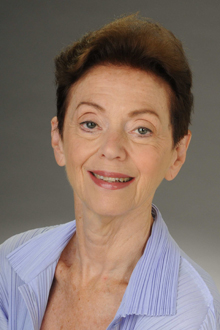Families and Work Institute to honor Barnett
Women's Studies Research Center scientist focuses on stereotypes

Dr. Rosalind Barnett
Dr. Rosalind Barnett, senior scientist at the Women's Studies Research Center, has been fighting gender inequality and stereotypes her whole career.
It’s kept her very busy.
“Once you knock down one stereotype, another one pops right up,” says Barnett.
On June 3, the Families and Work Institute in New York City will honor Barnett for her long-time battle for gender equality. The institute, a nonprofit research organization that studies the changing workforce, family and community, will award Barnett and nine other recipients with its 10th annual Work Life Legacy Award.
Barnett has written well over 100 articles and is currently finishing her ninth book. Her work is particularly focused on how gender stereotypes affect women in every stage of life, from childhood to adulthood, from classrooms to boardrooms.
“I am interested in how stereotypes have gotten in the way of women reaching their potential,” Barnett said in a recent interview.
In the 1970s and 1980s, Barnett helped dispel the belief that women could not succeed both in the workplace and at home because they had a finite amount of energy. The idea was that if women spent all their energy at work, they couldn’t perform their duties at home and visa versa.
Barnett proposed that a person’s energy was related to the enjoyment of work rather than the amount of work. If a woman found both her work life and home life rewarding, she could work 60 hours a week and maintain her responsibilities at home, Barnett argued.
More recently, Barnett took on the myth that women can handle multiple roles if – and only if – they don’t aim too high in any one area.
If a woman tried to climb the ladder and failed, she was held up as an example of women’s limitations, Barnett said. If she succeeded, no one said a word.
“There is a whole group of Mom CEOs out there, with three and fours kids, and no one has ever heard of them,” Barnett said.
The latest fad in stereotyping is that women have achieved too much and now it’s men who are falling behind. Barnett points to “The End of Men,” by Hanna Rosin as an example of such thinking.
To Barnett, these theories are nothing more than “scare stories.” Women are still paid less than men, women still have to work harder for promotions, women are still less likely to be mentored, she said. “There is no gender equity.”
But that doesn’t mean she’s pessimistic about the future.
Her next book, “The New Soft War on Women,” co-authored with her long-time collaborator Caryl Rivers, is scheduled to be released in October. The book proposes ways to fix the system. Barnett said the solution starts with women, but it doesn’t end there.
“Women need to be better advocates for themselves, but corporations, media and government also have to play role and must take these problems seriously,” she said. “We certainly aren’t going to go backwards.”
Categories: Humanities and Social Sciences, Research





